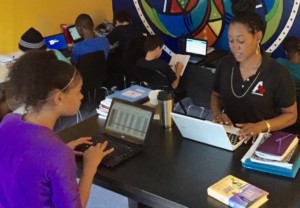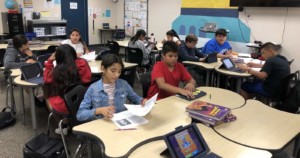Smart Culture: Reversing the Dumbing of America

America is not just increasingly anti-intellectual, it’s often just dumb. The rise of populism is, in part, an unwillingness to engage in the complexity of the society that we’ve created and mistrust of those attempting to do so. It is a rejection of science, a prideful naïveté, and a jingoistic belief in America’s divine election. America has always had a populist streak and it fits remarkably well with an entrepreneurial streak and a Calvinist work ethic. Populism allowed America to be sloppy with resources, chauvinist with people, and capitalist Monday to Friday and fundamentalists on Sunday. Television didn’t help. It asked little of us and made us sedentary physically and intellectually. TV probably cost America a few dozen IQ points over the last two generations.
Will the Internet prove to be more of the same? Some critics think the Internet is making us dumb. The Internet fundamentally changes the opportunity set. All the world’s knowledge and all the world’s garbage are both just one search away. The Internet appears to exacerbate innate tendencies—the smart get smarter while others will simply find new ways to waste time or inflict harm. Good parents find or create new ways to help their kids learn, others have no idea what their kids are up to online. Will the Internet make us smarter? It’s up to us.
America has a culture of weak or at least inconsistent academic press compared to India and China where, bottom to the top of the pyramid, an extended group of adults makes education the family priority. About five percent of US students are driven, supported transcript builders aiming at top selective colleges; a quarter do what it takes to make it to the state U; a third do enough to graduate and assume they’ll figure something out after high school. Almost a third drop out—and that includes half of the kids of color and half of the kids that grow up in poverty. About one third of US kids grow up with a single parent which can obviously be great, but it just reduces the odds that the student will have at least one person at home that gives a damn if they go to school, do their homework, graduate, and go to college.
Reversing the dumbing of America is a monumental cultural shift but it must happen for the country to remain economically relevant as the geopolitical center of the universe shifts from west to east. Perhaps the first generation of American young people that are worse off than their parents will be the beginning of a wake up call. The great recession should have been the alarm bell but there is little sign that it registered new collective insights. Government stimulus did just enough to protect bloated and ineffective education bureaucracies that, while conversations about productivity surfaced among the edu-intelligentsia, there was little fundamental reform. Arguments centered on economic competitiveness (e.g., did you know that there are 500 million kids in India and China working twice as hard and planning to kick your economic ass) don’t seem to register or drive behavior change. Maybe we can just make school suck less bad.
Efforts to make education more engaging and personal are, at least in part, an effort to substitute for a strong cultural press. It is pretty clear that we can build engaging media that builds persistence. We can build assessments that quickly diagnose learning levels and difficulties. We can introduce social media and mobile communications technology so that learning is a bit more like life. With smart student profiles, we can build personalized digital learning environments. We can expand access to the best teachers and the most effective learning experiences. With a little more effort we can build schools that cultivate curiosity. All of these will happen to varying extents during the decade to come and it will result in improved academic results measured in traditional and new ways.
But can we use the Internet to make our culture smarter? Chicago-based Sam Pitroda played a significant role in India’s telecom revolution and continues to advise the Prime Minister. He is bright and intensely focused on wiring the 250,000 panchayat, local village centers. The introduction of e-government, e-commerce, and e-health has clearly made the first few hundred remote Indian villages more productive, healthier, and more civically engaged. An online database provides these villages better public health records than US cities. These examples of new connectivity are clearly making these village cultures smarter. Nearly all US communities are connected and have access to the even more information, more opportunities to learn, and more avenues of participation, but most of us don’t take advantage.
Perhaps we can facebook our way to caring; a smart culture will include organized and informed parents in online communities. Perhaps we can rap our way to caring; a smart culture will use culturally relevant signaling. Perhaps we can play our way into caring; a smart culture will widely adopt engaging learning games and iTunes U learning playlists. Almost certainly, we’ll need to make it easy for parents to monitor and guide computer and mobile use for productive ends.
Dinner table conversation still matter. Parents won’t influence the online world if they’re not a visible active part of a student’s physical world.





Ed Jones
Friday the film Waiting for Supermanopens in select theaters. The premier was last Wednesday.
There's culture, and there's culture. What kind of culture arises when our city centers run schools as they do? What happens to the broad body politic when education for the many is sacrificed for the "rights" for an extreme few?
Replies
Douglas Crets
You make a great point, Ed. I think the culture that arises from current operations is (and I would paraphrase Geoffrey Canada here) one where kids who are more concerned about survival, approval and just getting by take that mentality with them out of school, and onto life outside of education. They become apathetic, and they become rooted in a kind of survival mode, holding on to institutions that don't really help them. They don't aggravate or get enthusiastic about being the agents of change. Education should create a culture of being aware of change and being change makers for ourselves.
Ed Jones
Yeah, Douglas, just to amplify on your thought...kids will always be concerned with "survival, approval and just getting by", but what remains with them after doing this for 12-18 years?
We stopped teaching history in many places in the '70s. Where we did teach it, we forgot about people. We taught of 'isms and grand overarching themes like the Industrial Age or the Progressive Era. We forgot to place in young people's minds the stories of people who stood up and hung in and made a difference.
I'm reading now The Spirit of the Frontier, of 1782 Ohio, the days before a massacre of 96 Christian Indians. It takes place within a few miles of where I grew up. Why in the world was I not given this book as a teen??
What leaps from these pages is the far reaching consequences of just a handful of personalities and their decisions. That's a theme repeated all through history. Yet we let youth think they are powerless before the 'system'.
This same failure continues into colleges, especially I'm thinking schools of education.
Replies
Douglas Crets
Thank you for this response. It's crazy that you never knew about this stuff as a teen. It reminds me of a theory / idea / innovation I have been thinking about with schools. Why not make them media hubs for news, history, community culture and anthropology? When I went on anthro field trips in college, I was always, ALWAYS, surprised at the people I met, the histories I learned and the cultural quirks I encountered. They were never documented. A lot of what goes on in a neighborhood is word of mouth. It escapes transcription. It's sometimes written about on walls, in stairwells, etc. But it's not in history books. I think that neighborhoods are always about the temporary. People live their day to day, and they think that the neighborhood is just that vessel for the daily and ephemeral. But Virginia Woolf showed us that you could write down the ephemeral, and document it. Why not make a school the "place of historical record?" The Little Rock High School where they had the famous civil rights encounter is a great example of this. It so happened that this hyper local history was also of national importance. At t he time, they were only able to realize that because ABC News, CBS and all those guys were parked out front documenting it. Now, you don't need ABC or CBS. Turn on the blog. Put up some web pages, use some foursquare technology, and make part of the school day an opportunity to record the daily historical record.
Heather
I have to tell you, you are going to go viral with this. I just saw a friend's sig quote, which was "Some critics think the Internet is making us dumb. The Internet fundamentally changes the opportunity set. All the world’s knowledge and all the world’s garbage are both just one search away. The Internet appears to exacerbate innate tendencies—the smart get smarter while others will simply find new ways to waste time or inflict harm. [Tom Vander Ark]"
A very concise and incisive observation, I think it will still be circulating many years from now. Congratulations, and thanks for the advice in the article, as well!